This report provides the findings from the annual survey of supply teachers in England and highlights the experiences of supply teachers during the academic year 2023/24
Introduction
The survey
Nature of work
Access to work
Availability of work
Experiences of supply teachers when undertaking work in schools
Experiences with schools, staff, parents and pupils when undertaking assignments
Provision of key information when undertaking assignments
Access to facilities and amenities in schools when undertaking assignments
Issues and concerns, including health and safety, for supply teachers
Rates of pay for supply teachers
Financial situation
Training and behaviour management support
Conclusion
Introduction
Supply teachers are integral to the education system.
Without supply teachers, many pupils would be denied the opportunity to be taught by qualified and dedicated teachers who ensure that schools can continue to provide the education to which children and young people are entitled.
Supply teachers make a vital contribution to securing high educational standards for all children and young people.
NASUWT’s annual survey of supply teachers in England aims to examine the changing experiences of supply teachers, including issues and trends.
The 2023/24 survey was undertaken between July and August.
A total of 925 supply teachers responded to the survey.
The survey
Nature of work
Supply teachers were asked why they carried out supply teaching work
The top five reasons cited by supply teachers were:
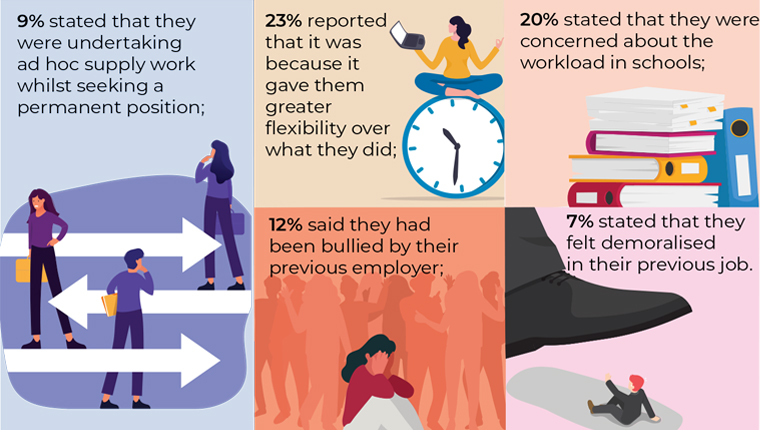
Wanted greater flexibility. The constant work scrutiny as a permanent class teacher just seems too much.
When asked what other advantages and disadvantages were associated with being a supply teacher, over a quarter of supply teachers (28%) cited work/life balance, just over a fifth (21%) cited the lack of financial/job security, just under one in ten (9%) noted the ability to choose the schools they worked at, 8% noted the fact that there was no planning/marking, and just over one in 20 (7%) noted the fact that they could go on cheaper holidays.
Supply teachers were asked about their ability to secure work teaching during the academic year 2023/24. Just under three quarters (73%) reported that they had no problems securing work, whereas just over a fifth (22%) reported that they had some problems securing work. Just under one in 20 (4%) reported that they had significant problems getting supply work and 1% stated that they could not secure any supply work.
I could hardly get regular supply work.
My agency was able to find work for me every day.
Agents said schools are cutting back and using TAs.
Whenever I wanted work, I easily could and had to turn it down. In June, I was unavailable and was asked to name my price, which I set at £300 a day, which the school paid.
I have had to register with ten agencies to even attempt to get a full week of work.
Access to work
During the academic year 2023/24, just under a quarter of supply teachers (24%) reported that they were working for one school, just under one in ten (9%) reported that they were working for two schools, and 10% reported that they were working for three schools. Eight per cent reported that they were working for four schools and just over one in ten (12%) reported that they were working for five schools. Well in excess of a third of supply teachers (37%) reported that they were working for more than five schools.
Of those supply teachers who reported that they were able to secure work during the academic year 2023/24, just over two fifths (81%) said that they had secured work through a supply agency, whilst just under a fifth (18%) reported that they had secured work directly as a supply teacher by a school, and just 1% stated that they had secured work via a local authority supply pool.
For those supply teachers working through an agency during the academic year 2023/24, just under three fifths (58%) stated that they were signed up to one agency to secure work, just over a quarter (26%) reported that they were signed up to two agencies, just under one in ten (9%) reported that they were signed up to three agencies, and 4% reported that they had signed up to four agencies. Three per cent reported that they were signed up to five agencies.
For those supply teachers working through a local authority during the academic year 2023/24, three quarters (75%) reported that they were signed up to one local authority, just under one fifth (18%) reported that they were signed up to two local authorities, and just over one in 20 (6%) reported that they were signed up to three local authorities. One per cent of supply teachers stated that they were signed up to five local authorities.
Seventy per cent of supply teachers said they worked directly for a school during the academic year 2023/24, 14% stated that they were employed by two schools, just under one in ten (8%) stated that they were employed by three schools, and 2% stated that they were employed by four schools. Just over one in 20 (6%) stated that they were employed by five schools.
A couple of schools book me directly now I know them.
It’s always through an agency and you never get paid to scale.
Seventeen per cent of supply teachers stated that this was more than during the previous academic year, whereas 15% reported that this was less, and 68% stated that it had stayed the same.
As a supply teacher, I have been able to obtain all the work I wanted to.
The teacher shortage is definitely showing and it is a good time to be a supply teacher.
It has decreased recently, partly due to financial restraints within schools.
Schools don’t seem to be using supply teachers to cover absent colleagues. They are now using the regular teachers or SLT.
A third of supply teachers (33%) reported travelling between 0-10 miles for an assignment, in excess of a third (37%) reported travelling between 11-20 miles, just under a fifth (19%) reported travelling between 21-30 miles, 6% reported travelling between 31-40 miles, and 2% reported travelling between 41-50 miles. Another 2% of supply teachers reported travelling between 51-60 miles for an assignment and 1% reported travelling between 61-70 miles during the academic year 2023/24.
Seventeen per cent of supply teachers reported that they had to travel further than in previous years in order to secure work.
Well in excess of half of supply teachers (56%) stated that the cost-of-living crisis had a detrimental impact on how far they were willing to travel to undertake an assignment.
Availability of work
Supply teachers were asked where they were able to obtain work during the academic year 2023/24.
Forty-five per cent who responded to the survey stated that they were able to secure work in primary schools, just under a quarter (24%) stated that they were able to secure work in secondary schools, and just under one in ten (8%) reported that they were able to secure work in a special school/pupil referral unit (PRU). Just under a quarter (23%) of supply teachers stated that their work was in ‘other’ settings (e.g. further education colleges).
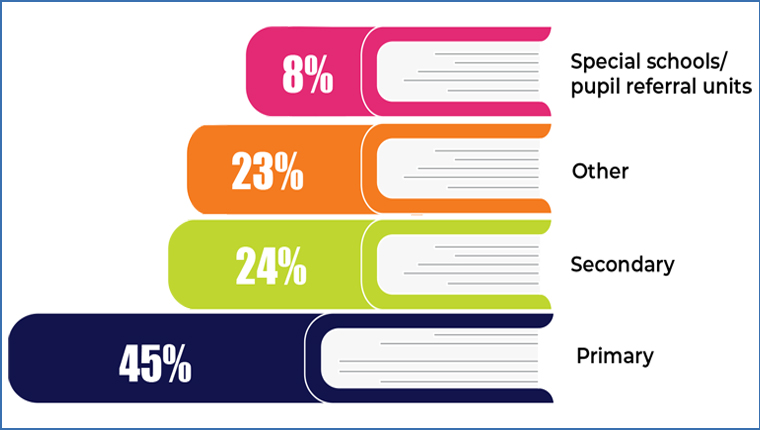
For those supply teachers who reported that they were able to secure work during the academic year 2023/24, well in excess of two fifths (47%) reported that the majority of their supply teaching was ad hoc/daily work, 7% said that this was weekly assignments, and 3% stated that this was monthly assignments. Just over one in ten supply teachers (12%) reported that the majority of their work was termly assignments and just under a third (31%) stated that the majority of their teaching was on longer term assignments in excess of a term.
When supply teachers were asked how many days on average they were able to obtain work during the academic year 2023/24, almost one in ten (9%) said they obtained work one day a week, just under one fifth (18%) two days a week, and just over a quarter (26%) three days a week. Sixteen per cent of supply teachers in the survey said they were able to obtain work four days a week and 31% stated that they were able to obtain work five days a week. However, just over three quarters (77%) said that they wanted to work between three to five days a week.
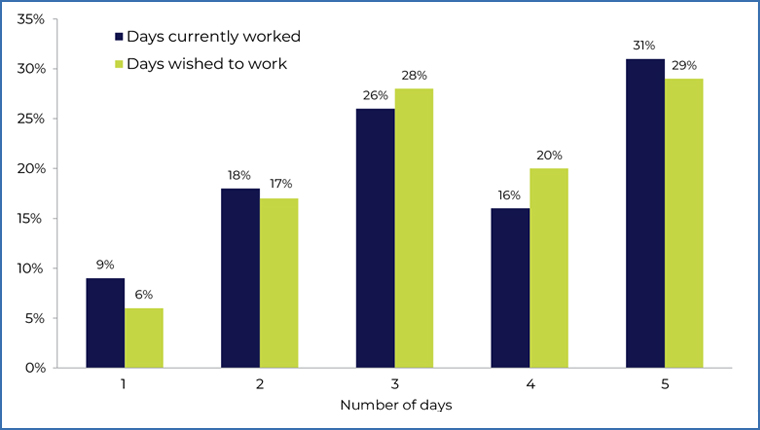
A fifth of supply teachers (20%) stated that the amount of supply work had decreased during the academic year 2023/24 when compared to the previous academic year, whereas just under a quarter of supply teachers (19%) stated that the amount of supply work had increased. Just over three fifths of respondents (61%) stated that the amount of supply work they were able to secure had stayed the same.
Experiences of supply teachers when undertaking work in schools
Supply teachers were asked about their experiences when working during the academic year 2023/24.
Despite it being a legal requirement since April 2020, just over a third of supply teachers (36%) who obtained work through a new supply agency reported that they had been provided with a Key Information Document (KID), detailing how they would be paid, associated deductions and other key details. A further two fifths (40%) stated that they did not know whether or not they had been provided with a KID by the agency.

In my experience, all agencies avoid giving out a KID, or any information in writing
At the first agency I joined, Prospero Teaching, the agent told me he didn’t know what a Key Information Document was. They employed me through an umbrella company who provided me with no information either.
Just under one in ten supply teachers (8%) stated that they had been asked to undertake a ‘free trial’ by an agency at a school prior to undertaking paid work.
The agency told me to go for an interview which would be a free trial, but I told them I couldn’t go if I was not going to get paid.
I know other supply teachers who have done up to three free trial days and not one of the schools gave them any paid work.
Fifteen per cent of supply teachers stated that work had been cancelled on specific longer term assignments at, or approaching, the 12-week qualification period for the Agency Workers Regulations (AWR).
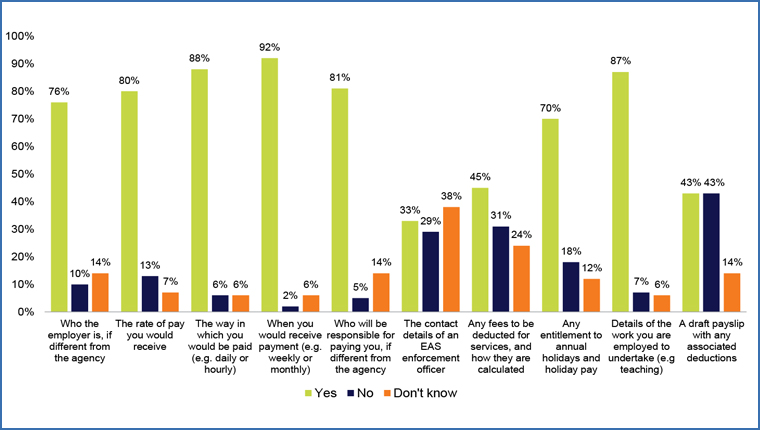
Just over two fifths of supply teachers (41%) reported that an agency had suddenly and unexpectedly terminated a booking in the last 12 months. Of those, just under three fifths (59%) stated that this had occurred once by one agency and just over one in 20 (6%) stated that this had occurred once by multiple agencies. However, just under a quarter (23%) reported that this had occurred more than once by one agency and just over one in ten (12%) reported that this had occurred more than once by multiple agencies.
I have been cancelled as I have arrived at the school. I have been cancelled when I am driving and more than halfway there.
Justteachers seem to do this regularly. I suspect that they want to book me in to work for them, so they book me for one assignment, whether genuine or not, and then reallocate exact work nearer the time.
Schools sometimes cancel a booking at very short notice and there is no recompense for the supply teacher. I have had cases where I have turned down work because I’ve already been booked to teach at another school, only for that school to cancel me last minute and leave me with nothing.
Experiences with schools, staff, parents and pupils when undertaking assignments
Just over three fifths of supply teachers (63%) reported that they are always made to feel welcome by the school and 30% stated that they are often made to feel welcome by the school. However, one in 20 (5%) said that they are rarely made to feel welcome by the school and 2% reported that they are never made to feel welcome by the school.
When asked how welcome they are made to feel by the teaching staff in schools, just over a third of supply teachers (34%) reported that they are always made to feel welcome and just over half (52%) reported that they are often made to feel welcome. However, just over one in ten supply teachers (11%) stated that they are rarely made to feel welcome by the teaching staff in schools and 3% reported that they are never made to feel welcome by the teaching staff in schools.
When asked how welcome they are made to feel by the support assistants in schools, 29% of supply teachers reported that they are always made to feel welcome and just under half (48%) reported that they are often made to feel welcome. However, just over a fifth of supply teachers (21%) stated that they are rarely made to feel welcome by support assistants in schools and 2% stated that they are never made to feel welcome by support assistants in schools.
When asked how welcome they are made to feel by the administrative staff in schools, well in excess of two fifths of supply teachers (44%) reported that they are always made to feel welcome and just over a third (35%) reported that they are often made to feel welcome. However, 14% reported that they are rarely made to feel welcome by the administrative staff in schools and just over one in 20 (7%) reported that they are never made to feel welcome by the administrative staff in schools.
When asked how welcome they are made to feel by the pupils in schools, just over a fifth of supply teachers (21%) reported that they are always made to feel welcome and just over a third (34%) reported that they are often made to feel welcome. However, another (34%) reported that they are rarely made to feel welcome by the pupils and just over one in ten (11%) stated that they are never made to feel welcome by the pupils.
In respect of being made to feel welcome by the parents, one in 20 supply teachers (5%) stated that they are always made to feel welcome and 14% stated that they are often made to feel welcome. However, under two fifths (37%) stated that they are rarely made to feel welcome by the parents and well in excess of two fifths (44%) stated that they are never made to feel welcome by the parents.
Just over nine out of ten supply teachers (92%) indicated that they had reported the incident/s to someone in the school; however, of those who did report the incident, a fifth (20%) stated that no action was taken against the pupil, and a third (33%) stated that they didn’t know or were not informed whether or not any action was taken.
A Year 4 boy said he wished he could punch me in the face - the next day he said he wished he could get a shotgun and shoot me.
Nothing was done. SLT said to pupil in front of me, ‘Don’t worry, he is only a supply teacher so won’t be here long.’ This totally undermined me.

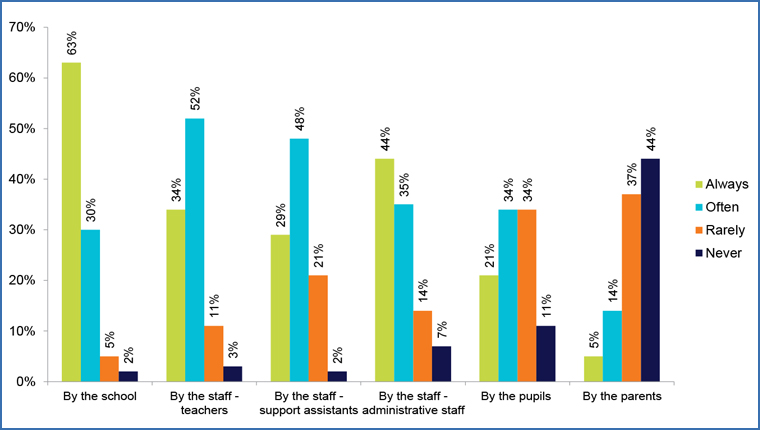
Provision of key information when undertaking assignments
Supply teachers that were able to secure work were asked about the provision of key information when undertaking supply teaching during the 2023/24 academic year.
Just over half of supply teachers (51%) stated that they were not given the school’s overall risk assessment and over one in ten (13%) stated that they were not sure.
Just under a third of supply teachers (32%) stated that they were not told the arrangements in place for supply teachers to report safely to the workplace and three fifths (60%) stated that they were not given the details of any procedures and protective measures in regards to Covid-19, including any financial support available.
Fifty-six per cent of supply teachers stated that they were not provided with the details regarding access to, and availability of, hand sanitiser and just under three fifths (58%) reported that they were not provided with the details in place to ensure classrooms and work areas were well ventilated.
Seventeen per cent stated that they were not provided with the details of any designated contact(s) for any questions, problems or emergencies and just over one in ten (11%) reported that they were not given the details of who and where to report to each day, including details of the signing-in process.
Twenty-nine per cent of supply teachers reported that they were not provided with the details of how to raise any concerns about health and safety and 30% reported that they were not provided with the details of how to call for assistance, including first aid. Furthermore, well in excess of half of supply teachers (56%) reported that they were not provided with the details of the nearest first aid room or appropriate area.
In regards to the school’s fire evacuation plans, including routes and procedures, 30% of supply teachers reported that this was not provided to them when undertaking assignments in schools during the 2023/24 academic year.
The availability of information varies between schools and sometimes between classes.
Just under a third of respondents (31%) stated that they had not been given a tour of the school site, including identifying where they would be teaching when undertaking assignments in schools.
In respect to the timetable, including breaks and lunch periods, as well as expectations on staff during such times, a fifth of supply teachers (20%) reported that this information was not provided to them when undertaking assignments in schools.
Just under a quarter of respondents (23%) reported that they had not been provided with the details of the registration process and expectations for the appropriate movement of pupils around the school site between lessons, at breaks and at lunchtimes, and at the end of the school day when undertaking assignments during the 2023/24 academic year.
In regards to teaching, just over a quarter of supply teachers (26%) reported that they were not provided with details of how to access relevant information on schemes of work for the subjects they were expected to teach and 28% reported that they had not been provided with access to relevant teaching materials.
Supply teachers are given very little information because they [schools] deem it private. This has made it extremely difficult to meet children’s needs.
In addition, 16% of supply teachers stated that they were not provided with the details regarding access to computers, with login details and what to do at the end of the school day and half (50%) reported that they were not provided with the details of any resources they might reasonably be expected to provide to students, such as pens.
Over a third of respondents (37%) stated that they were not provided with a list of the pupils in the class(es) they would be teaching, including details of any medical conditions, behavioural issues or special educational needs and disabilities (SEND) and just over half of supply teachers (52%) stated that they had not been provided with the details of any pupils known to be potentially violent and how this should be managed.
Furthermore, just over a quarter of supply teachers (27%) reported that they had not been provided with the behaviour management policy when undertaking assignments in schools, including who to contact.
Just under two fifths of supply teachers (38%) reported that they had not been provided with the details of any events, meetings or specific activities taking place and just over half (51%) stated that they had not been provided with the arrangements for school transport, as appropriate, when undertaking assignments during the 2023/24 academic year.
I have always had to ask for information and have made a point of always asking for the fire safety route.
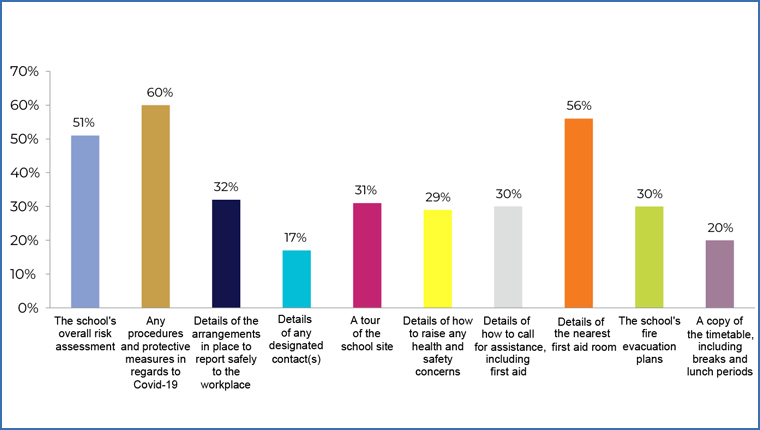
Access to facilities and amenities in schools when undertaking assignments
When asked about their most recent assignment, 28% of supply teachers stated that they do not always have access to staff rooms where they were available, well in excess of half (55%) stated that they do not always have access to staff food and drink facilities, and 16% said that they do not always have access to toilet/washroom facilities. Just under half of supply teachers (48%) reported that they do not always have access to car parking.
When asked about the assignments undertaken during the academic year 2023/24, just over three fifths of supply teachers (61%) reported that they had access to a designated contact person all of the time, whereas just over a fifth (21%) reported having access to a designated contact person some of the time. Just under a fifth of supply teachers (18%) reported that they did not have access to a designated contact person.
Issues and concerns, including health and safety, for supply teachers
Just over a quarter of supply teachers (26%) stated that they do not feel that any issues and concerns they have raised are taken seriously and just under a fifth (19%) stated that they didn’t know.
Well over a third of supply teachers (37%) who secured work during the academic year 2023/24 stated that they were concerned about their health and safety when in schools and 7% thought that they may have been penalised or had work cancelled for disclosing personal information about their health and safety (e.g. pregnant).
I am autistic and often find the situation different after the school are informed.
Having work cancelled due to being pregnant.
Rates of pay for supply teachers
Supply teachers were asked about the rates of pay they were able to secure for assignments undertaken during the academic year 2023/24.
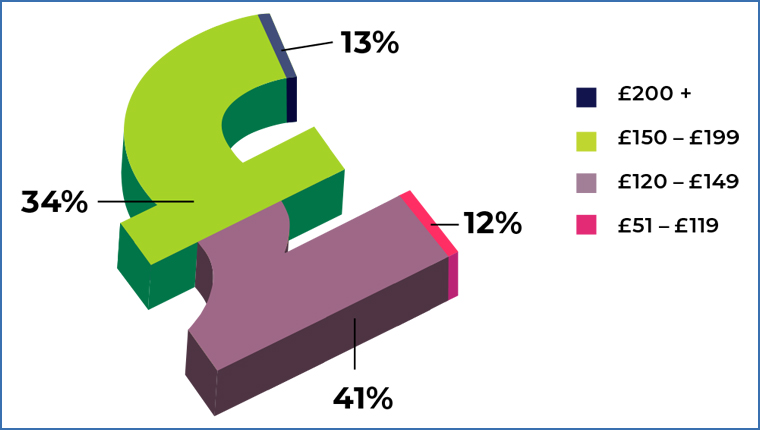
Just over one in ten supply teachers (12%) stated that they were paid between £51 and £119 per day for assignments, just over two fifths (41%) stated that they were paid between £120 and £149 per day for assignments, and just over a third (34%) stated that they were paid between £151 and £199 a day for assignments. Thirteen per cent said that they were paid £200 or more per day for assignments.
Pay is an issue. In 2007, I was on £154 a day as I’d been teaching for many years. This was cut to £130 in 2010 and it was ‘take it or leave it’. The daily rate remained at the same level, until this year where I noticed I’m being paid an extra £5 a day. I’m expected to do the same job as when I was paid £154.
£123 is their experienced teacher rate.
Just over half of supply teachers (52%) indicated that the rates of pay received during the academic year 2023/24 were the same as those they were able to earn in the previous academic year, whereas just 14% reported that the rates of pay received were less than those they were able to earn in the previous academic year. Just over a third (34%) said that the rates of pay received had increased from those they were able to earn in the previous academic year.
Permanent staff will have had some increases in their pay over the years. Supply stays the same, with no increase for over seven years.
I changed agencies and asked for a higher daily rate.
Only £5 per assignment more than previous years
When asked if the agency/agencies where they undertook work during the academic year 2023/24 operated a ceiling in respect of their remuneration, well in excess of half of supply teachers (55%) reported that the agency/ agencies did.
Vision have told me £133.50 is their maximum
Everyone paid the same, regardless of experience.
Yes, all agencies offer what they call a ‘standard rate’.
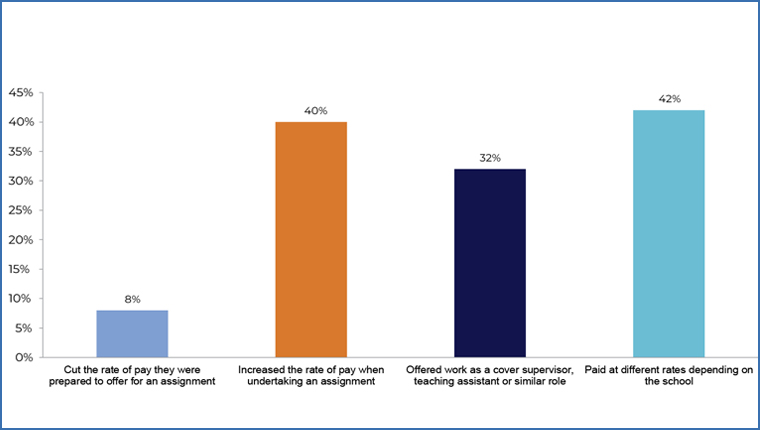
41% of supply teachers stated that they had been able to negotiate or secure an increase in their daily rate with an agency/agencies during the 2023/24 academic year
Extra for petrol as travelling further.
When I negotiate my rates directly with schools, I increase my rate year on year.
24% of supply teachers stated that they were able to secure more money when working through a local authority or directly with a school in comparison to supply work through an agency
I used to work for Link Agency, where the daily rate was around £110. My old school where I currently have a supply contract pay me double that.
£90 more per day.
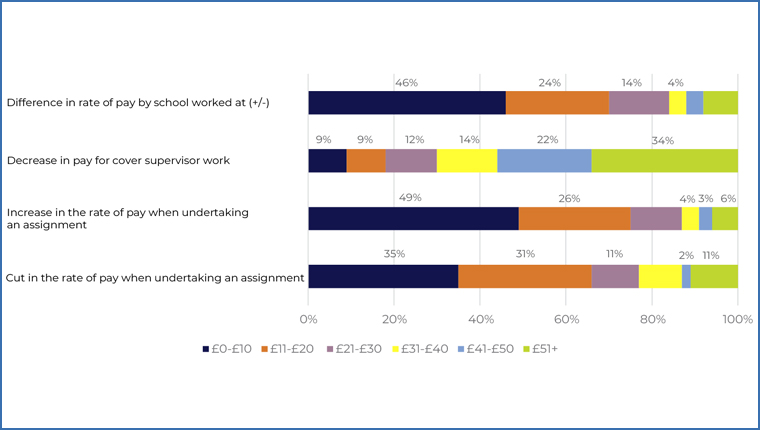
Teaching personnel have asked me to do TA work at a rate of about £60 a day, which is half my teaching daily rate.
Depending on the region, I will get paid differing amounts.
Just over one in 20 supply teachers (6%) stated that they were able to secure work through the National Tutoring Programme (NTP) during the academic year 2023/24.
Of those who secured work through the NTP, just over a fifth of supply teachers (22%) reported receiving rates of pay which were more than they normally received as a supply teacher, whilst 29% reported receiving rates which were less than they normally received as a supply teacher
I rejected it as the rate was so low!
I applied to many agencies regarding NTP. Most did not respond. It has been disappointing and misleading.
Financial situation
Supply teachers were asked about their financial situation during the academic year 2023/24.
Well over a quarter of supply teachers (28%) reported that they had sourced work elsewhere other than teaching during the academic year 2023/24.
Of those, well in excess of four fifths (86%) stated that the work sourced elsewhere other than teaching failed to provide the same level of financial income that they would have obtained had they been able to secure work teaching.
Just over one in ten supply teachers (12%) reported having to claim some form of state benefit during the academic year 2023/24 (e.g. Universal Credit) and well in excess of two fifths (44%) stated that they had experienced financial hardship as a supply teacher over the same period.
44% stated that they had experienced financial hardship as a supply teacher
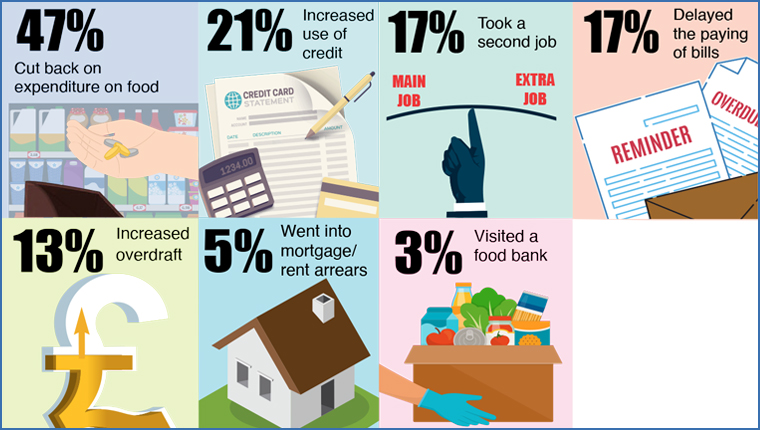
74% of supply teachers who responded stated that undertaking supply work, and the inability to secure a permanent post, had affected their ability to make significant life decisions
Not used central heating in autumn and winter.
I just have saved very little, despite working hard and doing long hours. I am 46, I am not getting a pension and I don’t see how I could ever afford to buy a house or apartment on these wages. It’s bleak.
As a part-year worker, I have had to borrow money from family to meet monthly bills and family have bought food shopping and paid for petrol for me to get to work most months.
Pensions
Whilst the legislation prevents supply teachers working for a supply agency from paying into the Teachers’ Pension Scheme (TPS), just over three quarters (77%) stated that they are still members of the TPS. Of these, a quarter (25%) reported that they were active members, just over a quarter (27%) reported that they were deferred members, and 25% reported that they were drawing a pension.
Of those supply teachers who indicated that they were not members of the TPS, just over a quarter (27%) reported that they did not have any alternative pension scheme provision and just under one in ten (8%) reported that they were unsure.
I wish I could pay into the TPS, but I am frustrated that it isn’t possible to do so through supply agencies. This feels like a two-tier system in remuneration as well as in other ways.
This is the biggest issue for supply teachers - I have been unable to pay contributions to the TPS for many years. Agencies provide NEST, but not being allowed to add contributions to TPS is very unfair.
Training and behaviour management support
Under two fifths of supply teachers (37%) stated that they had not been given access to continuing professional development (CPD) in the last 12 months.
For those supply teachers who had access to CPD, the primary sources of training were obtained via a supply agency (70%), the schools at which they worked (36%), funded personally (11%), or from their trade union (10%).
37% of supply teachers stated that they had not been given access to CPD
In regards to participating in in-service training (INSET) days provided by schools during the 2023/24 academic year, just 16% of supply teachers reported that they were asked to participate in all the schools where they undertook assignments, whereas just under one in 20 (4%) reported that the majority of schools asked them to participate in INSET days, and 13% stated that a few schools asked them to participate in INSET days.
They never want to pay you for training. It would have to be unpaid
29% of supply teachers stated that they did not feel they are treated with respect and dignity
Mostly feel respected and always thanked for my work.
Treated as the lowest of the low. Lots of school staff who wrongly assume you do supply because you can’t get a permanent role.
In general, you are treated like a second-class citizen. Most people think you can’t obtain a ‘proper’ job as a ‘real teacher’!
You are seen as disposable, no matter how good a worker you are.
The ‘supply’ can mean you’re saving the day or a minor irritation because you don’t know things and require some assistance. Many staff are very friendly and helpful, others are unhelpful, unfriendly and unsympathetic about the challenges of working in an unfamiliar environment.
I’ve had enough of walking into toxic environments, being treated unfairly, being ripped off by agencies, having no secure financial status and worrying about day-to-day cost of living.
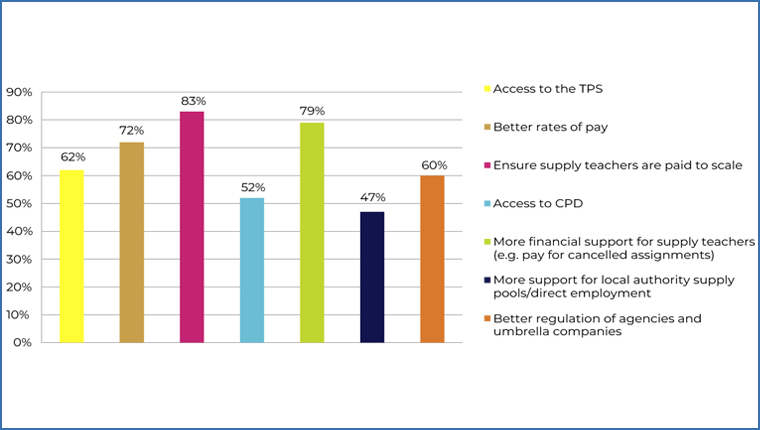
Based on their experiences as a supply teacher during the academic year 2023/24, just under two fifths of supply teachers (37%) reported that they were looking for work outside of teaching
I have been a supply teacher for 35 years and I earn less now than I did ten years ago, when I was paid through the local council and paid to scale.
Supply teachers are always bottom of the pile and seen as disposable. It’s a tough job and financially precarious.
I love supply teaching, but I wish we were more respected. What we do is not easy.
Conclusion
The survey of supply teachers emphasises the crucial role that supply teachers have played in schools and colleges in England during the 2023/24 academic year.
However, the survey suggests that the experiences of supply teachers throughout the 2023/24 academic year have been varied. For some supply teachers, the opportunities for work have increased, whereas others have found that they have been forced to travel further in order to secure work, despite the ongoing cost-of-living crisis.
In addition, due to the increase in the number of supply teachers reporting that the amount of supply work available was less than during the previous academic year, as well as a decrease in the number of supply agencies, schools and local authorities providing work during 2023/24, it is no surprise that there are some supply teachers in England who have reported having to source work elsewhere other than teaching.
Despite more supply teachers reporting that the level of payments received for assignments has increased, it is still the case for other supply teachers that pay has stagnated or even been reduced when undertaking some assignments, particularly ad hoc work.
Given this, coupled with the vagaries of intermittent and insecure employment, more supply teachers have had to make tough decisions about their financial situation, including cutting back on their expenditure on essential items, such as food and heating. Some supply teachers have been forced into mortgage/rent arrears, as well as rely on the generosity of family and friends to make ends meet.
Disappointingly, the 2024 survey indicates that many school communities are no longer as welcoming to supply teachers, with a marked decline in those reporting that they are always made to feel welcome by the school, the staff, the pupils and parents.
The survey further suggests that there has been an increase in those agencies and schools that are failing to provide key information to qualified and dedicated supply teachers, including in regards to the pupils they are expected to teach, as well as critical health and safety information to enable them to discharge their duties safely.
There are concerns that these disparities in treatment are impacting disproportionately on women, Black and minority ethnic (BME) groups and disabled teachers, who are more likely to be employed as supply teachers.
In this context, the results from the 2023/24 survey substantiate the pressing need for a better deal for supply teachers which recognises and values the important and significant contribution they make to the education system in England.
The full survey report can be downloaded on the right/below.
